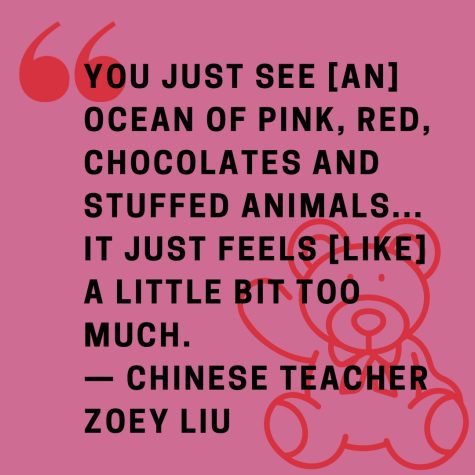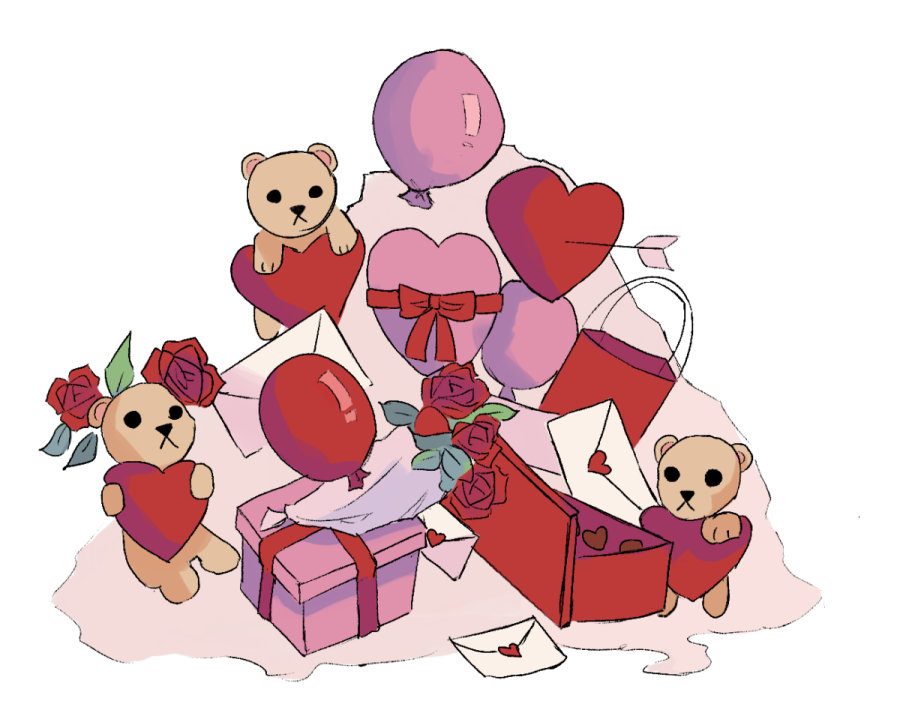Analyzing the downsides of the holiday of love
The MVHS community reflects on aspects of Valentine’s Day it wishes would change
While she now appreciates the tradition of expressing one’s love on Valentine’s Day, Liu finds that the commercialization of the holiday can be overwhelming.
February 4, 2022
With a childhood focused on academics, Chinese teacher Zoey Liu says she didn’t have much time to be thinking about romance as a teenager. She recalls the culture in China emphasizing that finding a significant other in high school would be “immature, not appropriate and a distraction from your academic work.” However, arriving in America in college opened her eyes and gave her a new perspective on romance, where Valentine’s Day brought forth couples everywhere engaging in grand gestures of love, so common it was almost to be expected.
“Growing up, I think it was a taboo to have a boyfriend or girlfriend in school,” Liu said. “There wasn’t a culture like [how it is] here [where] there’s singing [and] gifts. You can see people being very open and comfortable about it … but that wasn’t the case growing up in China.”
While she now appreciates the tradition of expressing one’s love on Valentine’s Day, Liu finds that the commercialization of the holiday can be overwhelming. The abundance of advertising that comes with Valentine’s Day is a stark contrast to the attitude surrounding romance that she grew up with.

“Going to Walmart or any kind of a grocery store you just see [an] ocean of pink, red, chocolates and stuffed animals,” Liu said. “Especially in supermarkets, you start seeing decorations or chocolates being sold a month ahead. It just feels [like] a little bit too much.”
On the other hand, senior Daniel Mathew views the myriad of chocolates and other treats during Valentine’s Day to be a benefit, making the holiday “easily accessible.” He feels that the pressure surrounding couples to do a lot for each other, especially in high school where showcases of love commonly include grand gestures, such as a poster or a bouquet of flowers, is an aspect of the holiday that is problematic. Mathew says that feelings of competitiveness can surface between couples about which couple conveys the greatest amount of appreciation for each other.
“I just dislike the pressure that it puts on some couples, the need to be overly romantic or show extra appreciation on that day,” Mathew said. “I know [a] few couples that were together on Valentine’s Day, and a lot of them, especially [being] in high school, … make posters, [gift] flowers, chocolate, that kind of stuff, so couples who don’t really want to be a show … are seen as not so ‘in love’ as other ones.”
The competition Mathew speaks to, as well as other feelings of unhappiness that may result from Valentine’s Day, is something sophomore Cara Constant attributes primarily to the influence of social media. She sees some people feeling “jealous” at couple posts by captioning their own posts with “I’m single again on Valentine’s Day.”
Constant also thinks social media pressure has resulted in exclusivity towards those not in a relationship to express their appreciation for close family and friends.
“Just spend it with whoever you want,” Constant said. “It’s Valentine’s Day, you shouldn’t have to just appreciate one person, you should appreciate all the people around you.”

















